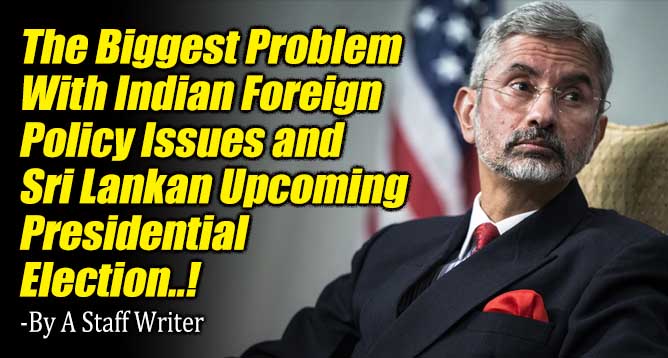-By A Staff Writer

(Lanka-e-News -17.Sep.2024, 11.55 pm) Indian diplomacy is currently facing significant challenges, and one of the central figures in this issue is Indian Foreign Minister S. Jaishankar. His stance, especially regarding neighboring countries like Sri Lanka, has raised concerns about India's approach to regional diplomacy. Jaishankar's statement during India's general election, where he hinted at reclaiming the Katchatheevu Island from Sri Lanka, has fueled tensions and complicated the relationship between the two nations.
Jaishankar's approach is part of a larger issue India faces with several neighboring countries, including the Maldives, Nepal, Burma (Myanmar), China, and Pakistan. In Sri Lanka’s case, the situation has become increasingly complex due to envy and political maneuvering. Sri Lanka’s surprising economic recovery from its recent crisis has caught India off guard, and this newfound economic stability has allowed Sri Lanka to exercise more diplomatic leverage.
One of the key points of contention between India and Sri Lanka is the Katchatheevu Island, ceded to Sri Lanka in a 1974 agreement. Jaishankar’s mention of reclaiming the island has sparked renewed diplomatic strain, underscoring the fragility of past bilateral agreements. Sri Lanka is using this issue to highlight the potential short-term nature of any new agreements with India, suggesting that Indian foreign policy could lack long-term commitment and consistency.
India’s recent foreign policy shifts, including its attempts to align with the USA in the Indo-Pacific region, while simultaneously maintaining ties with Russia, reflect Jaishankar’s complex diplomatic strategy. However, critics argue that his focus seems to have drifted away from strengthening ties with Sri Lanka and its immediate neighbors. A particularly controversial aspect is the growing presence of Indian conglomerate Adani in Sri Lanka’s energy market. Jaishankar is perceived to be facilitating this, creating concerns about a possible monopoly that could lead to higher electricity costs for the Sri Lankan population.
This short-term, deal-making approach is seen by some as a key flaw in Indian diplomacy, with Jaishankar often accused of prioritizing personal or political interests over the long-term benefit of the nation.
India’s involvement in Sri Lanka’s upcoming presidential election has added another layer of complexity. India is seen as attempting to influence the election through Sri Lanka’s Tamil political parties, particularly those representing the Tamil population living in the central regions of the country. However, Tamil politicians in Sri Lanka have pursued their own path, with a common Tamil candidate being proposed for the presidency, despite Indian pressure.
The internal struggles within Sri Lankan Tamil politics, particularly between TNA leader MA Sumanthiran and other Tamil leaders like Senathirajah, have further diminished India’s influence. This has been a diplomatic setback for India, which had hoped to unite Sri Lankan political factions like Ranil Wickremesinghe’s and Sajith Premadasa’s camps to oppose the National People’s Power (NPP) party.
India’s attempts to shape Sri Lankan politics through diplomatic channels and media campaigns have largely failed. The growing strength of the NPP and its leader, despite opposition from Indian social media and diplomatic circles, suggests that Jaishankar’s diplomatic strategy in Sri Lanka has not succeeded. As the Sri Lankan presidential election approaches, the cracks in Indian diplomacy, particularly under Jaishankar’s leadership, are becoming increasingly apparent, raising questions about the future of India’s regional influence.
---------------------------
by (2024-09-17 21:01:06)
Leave a Reply